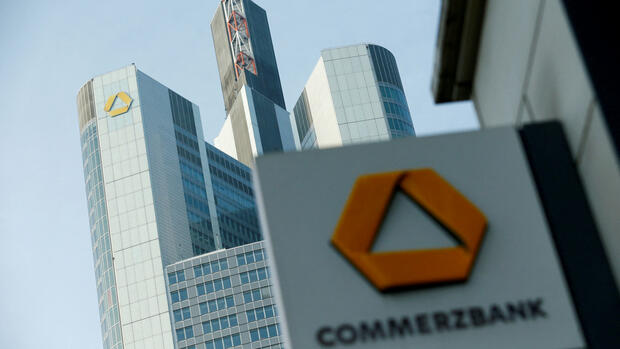Commerzbank explained that the write-down will not change anything for the time being on the German parent company’s goal of significantly increasing earnings in the current year.
(Photo: Reuters)
Frankfurt Commerzbank again has to deal with heavy burdens at its Polish subsidiary M-Bank. The institute announced on Friday evening that it would increase risk provisions for Swiss franc loans in the second quarter by EUR 342 million. The additional provision will have a corresponding negative impact on Commerzbank’s operating result.
The background to this is a ruling by the European Court of Justice (ECJ), which backed Polish bank customers in mid-June in the dispute over the controversial franc loans. The judges ruled that customers can, under certain circumstances, seek compensation from the bank for unfair terms in loan agreements.
Due to low interest rates in Switzerland, many Poles took out loans in Swiss francs to finance their homes. Then the national currency, the zloty, fell sharply against the Swiss franc, which increased the burden on borrowers. In many cases, the volume of the mortgage now exceeds the value of the property.
Many of those affected then went to court against Polish financial institutions because of possibly unlawful clauses – and recently they were more and more right.
Commerzbank CFO Bettina Orlopp had already declared immediately after the ECJ judgment that this would lead to further burdens for the Polish banking sector.
>>Read here: ECB rejects Commerzbank’s designated head of risk
At M-Bank, which recently had Swiss franc loans of 2.3 billion euros on its books, the provisions will increase to 1.7 billion euros with the increase that has now been announced. In addition, there are around 300 million euros that the institute has already paid out to customers as part of settlements.
Thanks to its profitable core business, its extensive provisions and its good capital base, M-Bank can face the verdict “from a strong position,” said CFO Orlopp. “M-Bank will continue to press ahead with its successful program of making out-of-court settlements with its borrowers.” Orlopp also wants “a legal solution to the foreign currency issue in Poland”.
Despite the new burdens in Poland in the current year, Commerzbank is still aiming for a significantly higher consolidated result than in 2022, when it made a profit of 1.4 billion euros.
However, the outlook depends “on the further development of M-Bank’s Swiss franc loans and is based on the assumption that there will only be a mild recession in Germany,” said Commerzbank.
Fed: Money laundering prevention improved
There was also positive news for the institute on Friday evening. The US Federal Reserve said Commerzbank had improved its anti-money laundering systems. Corresponding requirements of the Fed would thus no longer apply.
The background to the measures is, among other things, Commerzbank’s transactions with Iranian and Sudanese customers in the years 2002 to 2008. The US authorities had therefore sentenced Commerzbank to a fine of 1.45 billion euros in 2015 and obliged them to use their anti-money laundering systems and improve terrorist financing.
In addition, the US authorities used a so-called monitor that was supposed to monitor the upgrading of the control systems at Germany’s second-largest private bank. However, he left the bank in 2019.
In addition, Commerzbank completed its first share buyback faster than expected. Within a good two weeks, shares were acquired for 122 million euros, an average of 10.05 euros, the bank said. On Friday, the Commerzbank share closed six percent lower at EUR 9.62.
“With the completion of our first share buyback program, we have successfully established this instrument for distributing profits,” said Orlopp. Together with the dividend, 30 percent of the profit went to the shareholders. This year, the quota is expected to rise to 50 percent.
More: Commerzbank fears further burdens in Poland after the ECJ ruling
